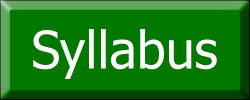CSCI 1321 - Syllabus
 |
 |
 |
|
 |
 |
 |
Location and Time - Halsell 228, 9:30-10:20 MWF (section 4) and 10:30-11:20 MWF (section 3)
Professor - Dr. Mark Lewis, Office: HAS 201K, Phone: 999-7022, e-mail: mlewis@trinity.edu. The best way to reach me typically is by e-mail. I check it frequently and try to respond promptly.
Office Hours - 2:30pm-5:00pm M, 9:30am-11:30am T, 1:00pm-2:30pm W or by appointment. I'm in my office a lot so you should free to drop by. If you are coming from lower campus you can always call or write a short e-mail to see if I'm in and available at that time.
Text - "Data Structures and Problem Solving Using C++" by Mark Allen Weiss. There are also a plethora of other books that you could, and probably should have on your shelf if you intend to be doing much of anything with the C++ programming language. A very complete, though high level discussion of C++ can be found in "The C++ Programming Language" by Bjarne Stroustrup, published by Addison-Wesley. A more approachable treatment can be found in "C++: The Core Language" by Satir and Brown published by O'Rielly or "Practical C++ Programming" by Oualline also published by O'Reilly. For information on the standard C++ libraries you can go to "The C++ Standard Library: A Tutorial and Reference" by Josuttis published by Addison-Wesley or "C/C++ Programmer's Reference" by Schildt published by Osborne/McGraw-Hill.
Course Description - This course is the secondary course in the introductory sequence for Computer Science. It builds heavily on the material of the first course and aims to improve your ability to solve problems using computer programs of your own construction. This course will further your ability to use more complex data structures and algorithms in the solution of such problems.
As my previous students can attest, the courses that I teach are aggressive. I have one overriding objective in my courses and that is to make you think. If I make you think new thoughts for most of the semester I will have done well. If I give you new ways to think thoughts (old and new), then I will truly have succeeded. This course is not about busy work, though inevitably a fair bit of work will be required. Exactly how much work you have to put in will often be inversely proportional to how much you think about the work that you should be doing. Writing programs on the scale of most of the assignments for this course requires a significant amount of design and thought to make sure that what you are trying to do will actually accomplish what you want it to and that it will do it correctly. Failure to think nearly always leads to more work for you in the end.
Assignments - The assignments in this course will all be based around a single problem. Each assignment will require you to produce a solution to a specific part of the problem so that all can be used together in the end for a single application.
For each assignment you will be expected to not only turn in a program that properly solves the problem, but also a design for that program that illustrates your thought processes in creating that program. The designs will be due typically a week before the programs themselves are. They will constitute 20% of the grade for each assignment and will not be accepted late (see below for late policy on the programs themselves). You will also submit a modified design with the final program that reflects the changes you had to make while writing the actual implementation.
The work you submit for your assignments should be of your own construction. You should feel free to confer with your fellow students or other people you might know about general questions dealing with the design of your programs or about specific syntactic problems. Having other people write code for you, or working from other people's code will be considered cheating and will carry repercussions as dictated by the student handbook. In general, the safest route when you have questions about assignments is to come talk to me. It should be said that this should in no way preclude you from studying the concept of computer programming with your follow students. Only discussions specific to the assignments are potentially risky.
Coding Practices - You are expected to follow certain coding practices for any code that you turn in as work in this course. In this sense I'm fairly lenient. I only require uniform indentation and reasonable documentation. The design work should force you to write enough documentation that incorporating it into the code will be easy. I will not help you to debug any code that it not well indented. I don't care exactly how you decide to align brackets or put in white space (though some white space is helpful), but you have to be uniform, and all blocks of code should be indented beyond what the surrounding code had been.
Grades - The grade for this course will be composed of four components. These components and what the entail is discussed below. This table summarizes how each component contributes to your grade in the course.
| Component |
Percentage
|
| Assignments (6) |
50%
|
| Tests (2) |
30%
|
| Quizzes (6 drop 1) |
10%
|
| Class Participation |
10%
|
Assignments - The nature of the assignments was discussed in the previous section of the syllabus. Six assignments will be given over the course of the semester and each will contribute equally to this portion of your grade. Unless otherwise specified, all assignments will be due on the date shown on the course schedule. Late assignments will be deducted 10 points for each day that they are late. After 5 days they will not be accepted. All submitted assignments must also compile and run using the g++ compiler on the CS machines. It doesn't matter if it worked for you under MSVC or Borland, if it doesn't work for me with g++ you will receive no more than 50% credit for the assignment until it is fixed and resubmitted (and then there will be a nominal penalty for being late).
Tests - There will be two tests during the course of the semester. The first is an in-class midterm exam and the second is the final. Each will count for 15% of your course grade. See the lectures page for the date of the first test. The final will be held during the normally scheduled time for your section. For the 9:30am class this is May 6th at 2:00pm. For the 10:30am class it is at May 7th at 8:30am. Makeups for If you are going to miss a test I MUST be told in advance, even if it is a phone call 5 minutes before class.
Quizzes - There will also be six quizzes given during the course of the semester. These quizzes serve many purposes in this class. First, it gives both you and I information about how well you are understanding the material in the class. Second, and more importantly, they will help you prepare for the test and the final. The quizzes will be short, 10 minutes, however, they will have questions that are similar in format to what you can expect to see on the tests (only fewer of them). They will be given promptly at the beginning of class to help insure that you arrive on time, and they will often cover material from the reading for that day to help provide you with incentive to actually do the readings. Note that these quizzes do not have a huge impact upon your grade. Because one of them is dropped, there will be no make-up quizzes.
Class Participation - I like you to participate in class. Discussion is typically far more entertaining than listening to me drone on for 50 minutes. It can also be more educational as the people most inclined to understand your confusion on certain points will be your piers. This part of the grade will actually come from 3 sources. The first is attendance. You can't participate in class if you aren't there. The second is verbal participation during class. I do keep track of this over the course of the semester and it does matter. Third, you can send me links to interesting things that you might happen to find on the web. If I think that they are significant enough, I will link them to the course web page. Each link you send me is worth participation points.
Extra Credit - During the course of the semester there will be a number of opportunities for you to receive extra credit. Most of the assignments should include extensions that you can do for extra points. In addition, I typically place extra credit problems on the quizzes and tests. You can also receive extra credit for displaying that you are thinking about the course material in a substantive way outside of class. This includes sending me links to sites that you think might be either helpful or just of interest to your fellow students. I'm considering also giving extra points at the end of the semester for students who participate at TopCoder.com and extra points to the student with the highest ranking there. You have to This should not take away significant time from your normal studies though. If you are willing, you can list the user TrinityCS as who referred you to the website. This will help fund computer purchases for the department everytime you win a tournament during the first year you are a member.